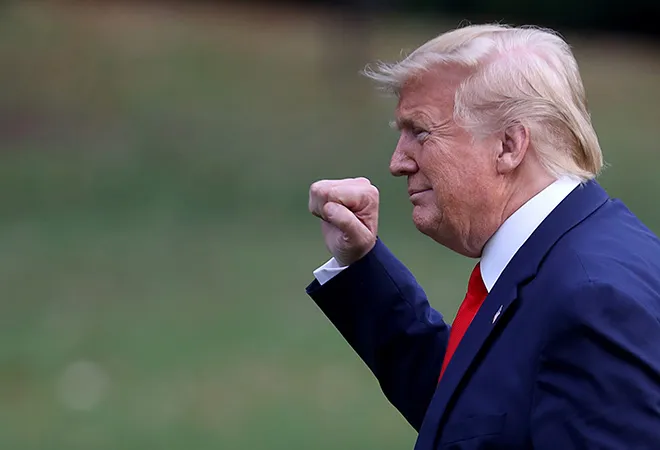-
CENTRES
Progammes & Centres
Location
For Trump, although bringing American troops stationed in Afghanistan has been one of the most important objectives, the calling off of the talks could possibly be a signal for the US’ readiness to continue fighting the war against terror, even eighteen years on.

On 7 September 2019, US President Donald Trump announced that he had cancelled a secret meeting with Taliban representatives that was going to be held in the presence of the Afghan President Abdul Ghani, at Camp David, effectively calling off all peace negotiations with the Taliban for the time being. Citing the reason for the abrupt halting of talks as the death of the US soldier Sgt. First Class Elis A. Burreto Ostiz in a suicide bombing executed by the Taliban in Kabul, the US administration stated that they would not succumb to antics trying to build “false leverage” in negotiations through violence on Afghan soil. Having said that, it was not the first time in the year that a US soldier serving in Afghanistan had lost his life, and so the timing of the cancellation of talks with the Taliban brings up questions regarding American motivations for taking the step.
As for President Trump’s decision to halt negotiations itself, there have emerged strong voices in favour of the move, basing their argument on the premise that the decision essentially avoided a “bad deal” from coming into place, which would not have been instrumental to the establishment of peace in Afghanistan. The proposed deal, which had purportedly taken the form of a draft agreement contingent on further political sanction, had focused on securing the conditions put forward by the Taliban, rather than those tabled by the US Special Envoy Zalmay Khalilzad. The draft agreement is said to have prioritised US withdrawal from Afghanistan, rather than implementing a comprehensive ceasefire, demonstrating a rigid Taliban stand on making any significant concessions whatsoever. As stated by Russian Presidential Envoy to Afghanistan Zamir Kubalov in an interview, the draft agreement did entail a ceasefire to be put in place on the signing of the document on 13 September, but it was to be limited to the fight against the US‒led coalition, not the Afghan forces, depriving the draft document of any real credibility. Even so, it is curious as to why talks were suspended when they were, given the fact that Khalilzad was working on securing an arrangement that President Trump had given his assent to, just the month before. It is impossible that the highest political echelons of the US government were clueless about where the deal was headed, and therefore were caught off‒guard by the preliminary agreement, agreed to “in principle.”
The draft agreement is said to have prioritised US withdrawal from Afghanistan, rather than implementing a comprehensive ceasefire, demonstrating a rigid Taliban stand on making any significant concessions whatsoever.
Political motivations aside, however, the halting of negotiations, especially at a time when the negotiating parties were said to have been very close to concluding a formal arrangement, surprisingly demonstrates the commitment of the Trump administration to its Afghan policy. It is clear that the US does not want to settle for anything less than a bonafide commitment from the Taliban to ensuring that Afghan soil is never again used as a terrorist safe haven, especially to devise attacks against the US and its allies, essentially bringing some semblance of peace to Afghanistan. However, it would be an act of great folly to presume that the Taliban would follow through on any such promise, even if they were to lend lip service to such a precondition. In fact, even as negotiations were going on in Doha, violence at the hands of Taliban fighters operating in Afghanistan was on a steady rise, becoming more and more ruthless with each incident. At the same time, it is not as if in the absence of a “peace deal,” the security situation in Afghanistan will not deteriorate any further, and innocent Afghans will be spared of incessant bloodshed and killing.
The question that arises therefore, is about the future of negotiations and resultantly, of Afghanistan itself, which depends on whoever has the upper hand in the fight. While it is amply clear that the balance of power is tilted in favour of the Taliban, both diplomatically and in combat, and that the Taliban are more than willing to continue the fight indefinitely, they certainly seem to be inclined towards securing a deal in the near future, which would help them preserve their cadres back home for when they may assume political office in Afghanistan. A deal therefore, especially one secured hurriedly, by building diplomatic pressure on the US by way of doubling down on violence in Afghanistan, would be entirely in favour of the Taliban. The Taliban, along with Pakistan, have even urged the US to resume negotiations as soon as possible, lest it become a lost opportunity for all stakeholders involved in the Afghan conflict. The Taliban has also called upon Moscow to leverage its goodwill with US Special Envoy Zalmay Khalilzad to facilitate the resumption of talks, but the US is yet to respond officially. For now, it is noteworthy that a Taliban delegation led by one of the cofounders of the movement, Mullah Baradar, has been in Pakistan engaging in discussions with the government of Imran Khan, and also met with Khalilzad on Friday, 5 October, although details of the meeting have not been made public yet.
While it is amply clear that the balance of power is tilted in favour of the Taliban, both diplomatically and in combat, and that the Taliban are more than willing to continue the fight indefinitely, they certainly seem to be inclined towards securing a deal in the near future, which would help them preserve their cadres back home for when they may assume political office in Afghanistan.
It is absurd, however, how Pakistan’s proximity to, and influence over the Taliban, is never explicitly questioned by the US or others involved in the great Afghan game. After all, Pakistan is looked upon as an indispensable entity in any attempt to bring the Taliban to drop their arms and partake in a permanent ceasefire — although no substantial gains have ever been made in that regard, putting Pakistan’s role as the all‒important mediator under much needed scrutiny.
On the other hand, Trump’s decision to cancel talks with the Taliban is being considered by many to be a negotiation tactic, to get the Taliban to concede to the fundamental demands made by the US, including the initiation of intra‒Afghan dialogue and a permanent ceasefire, which were not accorded any importance in the draft agreement. For Trump, although bringing American troops stationed in Afghanistan has been one of the most important objectives, the calling off of the talks could possibly be a signal for the US’ readiness to continue fighting the war against terror, even eighteen years on. That said, the unabashed unpredictability that President Trump has come to be associated with leaves considerable room for conjecture as to what the immediate future may hold for the conflict. To that end, the US would do well to lay down its strategic objectives and priorities vis‒à‒vis Afghanistan with more clarity and resolve, and convey the same to cooperative regional powers surrounding Afghanistan. Moreover, it goes without saying that any deal deciding the future of Afghanistan must accomplish two fundamental objectives; witness extensive dialogue between the Afghan government and the insurgents, and more importantly, reflect the collective will of the people of Afghanistan.
The views expressed above belong to the author(s). ORF research and analyses now available on Telegram! Click here to access our curated content — blogs, longforms and interviews.

Shubhangi Pandey was a Junior Fellow with the Strategic Studies Programme at Observer Research Foundation. Her research focuses on Afghanistan particularly exploring internal political dynamics ...
Read More +